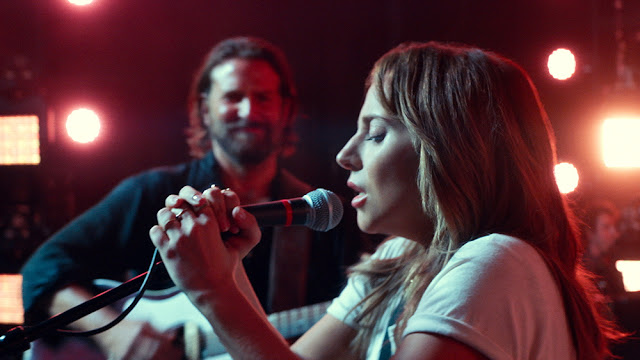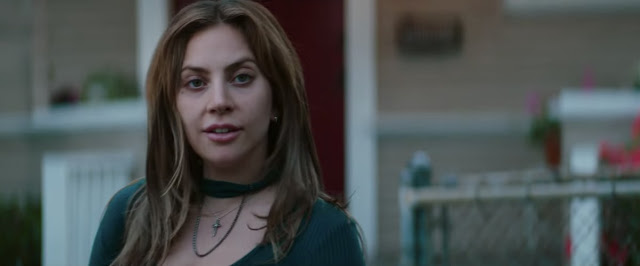As meta monologues go, it’s hard to imagine one more openly symbolic than the speech that Bobby (Sam Elliott) gives in A Star Is Born, Bradley Cooper’s sweet and soulful love story. Music, Bobby drawls, is just 12 notes between any octave. “It’s the same story, told over and over, forever; all the artist can offer the world is how they see those 12 notes.” Bobby is speaking about the constraining nature of music—a medium whose potential for variety is virtually limitless, but never mind—but it’s impossible not to read his remarks in the context of this movie, which is a remake of a remake of a remake. The cinematic notes underlying A Star Is Born have already been played. What matters now isn’t their sequence, but their presentation.
And measured against that yardstick, the film is a success. Its story is obviously familiar, but Cooper’s execution of it is spirited and stirring. It rather seamlessly transports the hoary themes of the 1937 original—a classic tale of fame, persistence, and possession—into the complexities of the present day, managing to feel timeless and contemporary at once. And perhaps most importantly, it features high-quality music, including a handful of truly triumphant scenes that help transform its leading lady from a pop phenomenon into a movie star.
That would be Lady Gaga, who plays Esther Ally, a waitress with an obnoxious boss, a zealously supportive father (Andrew Dice Clay), and a hidden hurricane of a voice. When she isn’t busing tables or scribbling down random lyrics, she sings at an LA drag bar. One random night, into the bar stumbles Jackson Maine (Cooper), an aging rock legend who suggests a hybrid of Johnny Cash and Jerry Garcia. Primarily occupied with the search for his next drink, Jackson seems to live in a permanent fog of cigarette smoke and befuddlement, but when he hears Ally’s rendition of “La Vie en Rose”, his ears perk up and his heart stops.
Students of the Star Is Born lineage will not be tripped up by what ensues. You know how the song goes: A famous male entertainer, battling addiction and approaching the downslope of his career, will find himself enthralled by a gifted but unknown young woman. He will wield his influence to thrust her into the spotlight, where she will guilelessly claim the adoration of a feverish public. They will fall in love—in the process, he will twice ask her to turn around so that he can “take another look”—but as her newfound celebrity swells, his will dim, resulting in conflict and heartache. Their romance, once simple and pure, will swirl into a toxic cocktail of personal ambition, professional jealousy, marital loyalty, and substance abuse.
As one American rock band might put it: same as it ever was. But the general adherence to this sturdy blueprint explains why each new incarnation of this particular story tends to hinge on the art within the art. That’s why, while William Wellman’s ’37 original is enjoyable and touching, the preeminent version of A Star Is Born remains George Cukor’s 1954 remake, which expanded Wellman’s film into a lavish Hollywood epic, and which featured a number of powerhouse musical performances from Judy Garland. By contrast, Frank Pierson’s 1976 edition, which starred Barbra Streisand and shifted the underlying dream from acting to songwriting, failed in part because Kris Kristofferson’s coke-snorting rocker produced absolutely nothing that might pass as pleasurable or popular music. (To be fair to Kristofferson, the aimless screenplay and vacant direction didn’t help.)
Here, on the other hand, the music is mostly polished and catchy, with a welcome range of country ballads and pop bangers. Admittedly, nobody is going to confuse Bradley Cooper with Bruce Springsteen. But with his careless hair and full beard, constantly clutching a black fedora and a bottle of pills (or a handle of whiskey), the first-time director looks the part of a troubled Southern-rock god. He sounds it too. Playing his own guitar (he and Gaga wrote most of the music themselves, with an assist from Lukas Nelson), Cooper sings in a fluid croon, sliding along the register without apparent strain.
But there’s a reason the movie isn’t called “A Star Dies”. As charismatic a presence as Cooper may be, the film is most notable as a centerpiece for Lady Gaga’s showstopping musical talents. That’s why A Star Is Born is most successful when it chronicles Ally’s meteoric ascent. Its grandest moment comes early, when Jackson invites Ally to join him at a gig, then abruptly pulls her onto the stage with him to perform a duet of “Shallow”, a ditty she’d randomly started improvising with him in a parking lot the night before. (Academy Awards enthusiasts: Be advised that this track is unquestionably winning this year’s Oscar for Best Original Song.) That may seem implausible, but artistic perfection can overcome henpecking realism, and when Gaga belts out “Shallow”’s chorus, you’ll find goosebumps forming on your skin and maybe tears welling in your eyes. It’s a transcendent, beautifully staged sequence that pays tribute to the awesome power of music.
A peak that high can’t last, for either the characters or the movie. Although Ally and Jackson initially fall headlong into love, their romance is built on a shaky foundation, and as Ally grows more popular—catching the attention of a predatory label producer (Rafi Gavron), landing a coveted performance on Saturday Night Live—Jackson’s own stature shrinks, creating tiny fissures that gradually deepen. At this point, the story becomes sadder, more tumultuous, and a little less interesting. Jackson is a decent man, but his mounting pettiness and resentment feel contrived, and the screenplay (by Cooper, Eric Roth, and Will Fetters) saddles him with a tedious backstory—involving his long-dead father and his bitter brother (Elliott)—that feels tacked-on and generic.
The strange thing is that, when it comes to evaluating Ally’s career progression, A Star Is Born seems to land on Jackson’s side. Ever the wise veteran, he warns her not to relinquish her identity, then chastises her when she deigns to cut a new record that proves to be a megahit. This holier-than-thou philosophy—the notion that adapting your art to popular tastes automatically means sacrificing your integrity—is a tiresome and familiar one, and in fact it recalls a key thread of La La Land. But where that movie nimbly avoided the trap it laid out for itself, this one falls smack into it with that SNL scene, where Ally performs a rambunctious, Britney-esque number with dyed hair, a troupe of dancers, and a whiff of auto-tune. I liked that song; the problem is that I’m pretty sure I wasn’t supposed to.
Yet even as A Star Is Born wallows in melodrama and artifice, it remains compelling and cathartic, thanks to its leading performances. Gaga’s main selling point is her knockout set of pipes, but she’s also wonderfully brittle; she plays Ally as more anxious than ambitious, conveying melancholy just as effectively as longing. As for Cooper, his directorial skills are uneven; he captures the intimacy of small moments, but his camera, routinely operated handheld, often seems as drunk as Jackson is. But he remains a deeply expressive actor, and here he inflects his natural magnetism with twinges of sorrow and regret. On the page, Jackson is an archetype, but Cooper turns him into a genuine tragic hero. (That dead-dad subplot may be ill-advised, but in an achingly halting exchange with Elliott, Cooper damn near pays it off anyway.)
At one point, Jackson tells Ally that plenty of people in the world are talented, but talent isn’t enough; you need to actually have something to say. A Star Is Born may not be a perfect movie, but when its central lovers are at the mic, voices in full bloom, it plainly passes its own test.
Jeremy Beck is the editor-in-chief of MovieManifesto. He watches more movies and television than he probably should.




